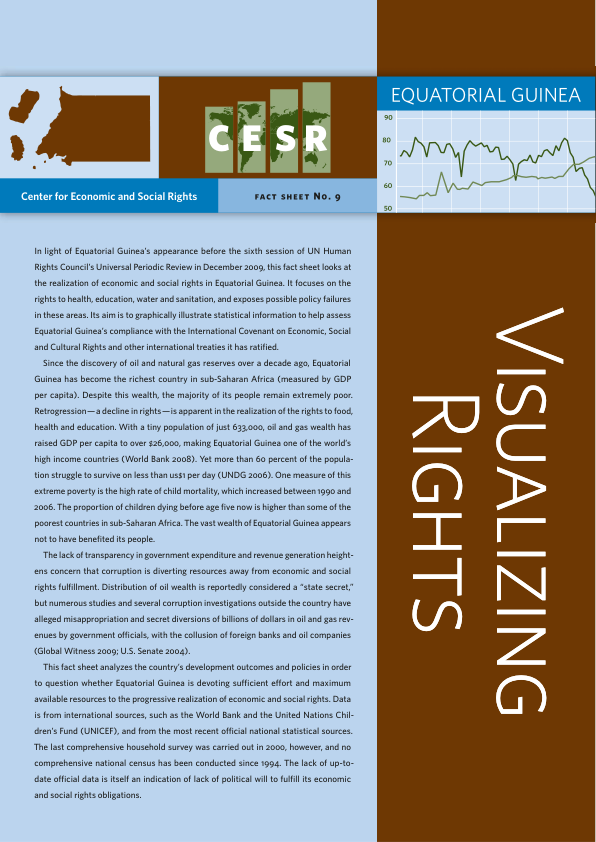MADRID???Despite becoming one of the world???s high-income countries,Equatorial Guinea has some of the worst economic and social rightsindicators in sub-Saharan Africa. Access to health and education hasdeteriorated as the country???s economy has boomed. The proportion ofchildren dying before age five has risen in the last 15 years and isnow higher than some of the poorest countries in the region.
This and other declines in the realization of the rights to health,education and water are documented in a new statistical analysis of thecountry???s economic and social rights outcomes, relative to itsresources. The analysis released today in English and Spanish by the Madrid-based Center forEconomic and Social Rights (CESR) comes as the Equatorial Guineangovernment is set to appear before the periodic review process of theUN Human Rights Council later this year.
Since the discovery of oil and natural gas reserves in the 1990s,Equatorial Guinea has become the richest country in sub-Saharan Africa,with a GDP per capita of over $26,000 in 2006. But almost two-thirds ofEquatoguineans still live in extreme poverty (less than $1 a day),unable to achieve an adequate standard of living. Neighboring Cameroonhas a GDP per capita less than one-tenth Equatorial Guinea???s; yet itspoverty rate is less than one-third that in Equatorial Guinea.
Among the other findings highlighted:
- Despite a rapid increase in the country???s wealth, fewer childrensurvive early childhood; between 1990 and 2006, both the number ofinfants who survived their first year and the under-five survival rateactually declined.
- Twenty percent of children under five are chronically malnourishedand stunted in their growth (under height for their age), more than inmost neighboring countries.
- Primary school enrollment rates have fallen sharply since the early1990s, and fewer than 60 per cent of pupils enrolled complete primaryschool. Boys are almost twice as likely to enroll in secondary schoolas girls.
- There has been no progress in improving access to sanitation from1990 to 2006. Just 45 percent of people in urban areas and 41 percentof rural people have access to an improved water source. The urban rateis the lowest in sub-Saharan Africa.
 The data, which in part measure the outcomes of government policies,raises serious questions as to whether Equatorial Guinea is doing allit can to realize economic and social rights progressively to themaximum extent of its available resources, as it is required to dounder the International Covenant on Economic, Social and CulturalRights and other international treaties.
The data, which in part measure the outcomes of government policies,raises serious questions as to whether Equatorial Guinea is doing allit can to realize economic and social rights progressively to themaximum extent of its available resources, as it is required to dounder the International Covenant on Economic, Social and CulturalRights and other international treaties.
???Critical measures such as ensuring access to skilled birth attendanceand protection against malaria appear woefully inadequate,??? saidIgnacio Saiz, executive director of the Center for Economic and SocialRights. ???Despite the country???s resources, government expenditure onhealth and education is far lower than the sub-Saharan Africanaverage???Equatorial Guinea gives a lower priority to primary educationspending than almost any other country in the region.???
The lack of budget transparency is a serious obstacle to holding thegovernment accountable for its use of oil-generated wealth, the CESRanalysis noted. It fuels concerns that official corruption andcorporate collusion are diverting resources away from the realizationof the basic rights of the majority of the country's people.
The new fact sheet is part of CESR???s Visualizing Rights series, whichanalyzes statistical data graphically from the perspective of acountry???s economic, social and cultural rights obligations. This focusis intended to help intergovernmental human rights mechanisms, such asthose of the UN, and national and international NGOs, monitorgovernments??? compliance with these obligations.
The Center for Economic and Social Rights works to promote socialjustice through human rights. In a world where poverty and inequalitydeprive entire communities of dignity, justice and sometimes life, weseek to uphold the universal right of every human being to education,food and water, health, housing, work and social security, and othereconomic, social and cultural rights essential to human dignity. It hasoffices in Madrid and New York.
CESR invites comments and feedback, and encourages requests to makegraphs, data and hard copy fact sheets available for NGO and other use.Please e-mail sstanton@cesr.org.
